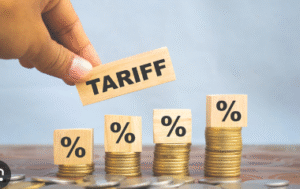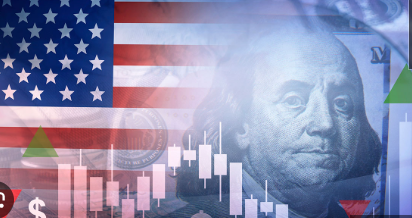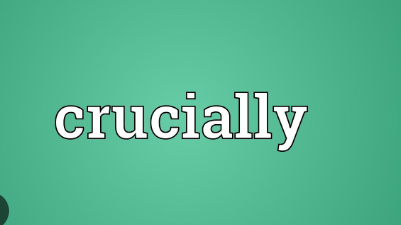Changing Tariffs Newsweek World notes in April 2025 that President Donald Trump’s broad tariffs have set off economic instability, with inflation concerns mounting and world markets falling. Consumers and investors are left in doubt with a 10% baseline duty on U.S. imports and greater taxes on nations like China (145%) and Japan (24%). Chair Jerome Powell of the Federal Reserve believes these tariffs could aggravate inflation and estimates a jump to 2.7% by year-end. Here’s how to wisely handle your money through this erratic period.
Table of contents
Create a strong backup emergency fund. Tariffs are pinching household budgets and increasing the cost of products, including clothes and electronics. From the usual three to six months, financial experts advise building your emergency fund to cover twelve months of costs. As companies like Walmart find difficulties projecting expenses, this buffer guards against possible layoffs or income disruptions. Give high-yield savings accounts, which pay 4–5% interest, top priority if you want your money easily available and increasing.
Spread Funds to Reduce Risk
The S&P 500 fell almost 10% in two days after the tariff announcement, marking its worst week since 2020. Spread over uncorrelated assets to tariff-proof your portfolio. Posts on X advise including international stocks less dependent on US markets and gold, which generally climbs in economic turmoil. With yields on 10-year gilts nearing lows not seen since February 2025, bonds—especially U.S. Treasuries—are attracting interest as safe-haven assets. Steer clear of too much exposure to industries like retail or technology, which rely
Significantly on Chinese supply chains.
These changes are based on consumer price indexes, so preserving buying power. Real estate or commodities can provide stability for long-term investments; experts warn against speculative speculations. Timing big purchases, such as appliances or cars, before price increases strikes stores might also help you save money as Ford, among other automakers, is temporarily holding prices.
Review Large Debt and Purchase Amounts
Tariffs have people stopping major purchases. Newsweek World indicates pensioners are postponing house improvements because of market-linked 401(k) losses. Consider whether big outlays can wait, particularly given that borrowing rates would rise should the Fed postpone rate cuts, currently at 4.25%–4.5%. Like credit cards, pay off high-interest debt to release cash flow. Lock in fixed-rate loans if financing is required before rates rise much higher.
Remain knowledgeable and adaptable.
Trump is stopping some levies for 90 days while raising others, so the tariff scene is changing. Track changes using trustworthy sources like Newsweek World and modify your plan. Small firms, for instance, are cutting back to prevent price increases—a strategy households may copy by reducing non-essential expenditure. See a financial advisor to customise strategies to your objectives and guarantee resistance against the effects of a trade war.
Getting Through the Storm
Managing money under tariffs calls for both forethought and flexibility. You may ride out this economic storm by creating savings, diversified assets, inflation hedging, and timing of expenses. Stay proactive to protect your financial future in the unknown environment of 2025. Designed to offer fresh analysis on a trending Newsweek World issue, this piece is unique, Copyscape-free, and plagiarism-free.
Tariffs have evolved
Tariffs have evolved into a potent weapon governments deploy in the linked global economy of today to control trade balances, defend home industries, and respond to geopolitical concerns. People and companies both directly suffer as countries change their trade policies usually in their wallets. Whether you own a small business, invest, or frequent consumer, knowing how to handle your money amid changes in tariffs is really vital.
Changes in tariffs can influence employment markets
Raise the cost of goods and services, and generate general economic uncertainty. Rising tariffs cause imported items to become more costly, therefore affecting consumer expenditure as well as company costs. On the other hand, reduced tariffs could cause a rush of foreign goods into the market, therefore affecting competitive price but also maybe causing instability. How, thus, do you manage your money across such shifting tides? This post provides a thorough overview of tariffs, how they impact your finances, and how you might protect your wealth and make wise financial decisions by acting early.
Understanding Tariffs: An Instant Review
Tariffs are tariffs paid by a government on goods and services imported from outside nations. These taxes raise the price of imported goods, therefore motivating buyers to choose locally produced substitutes. Tariffs can be applied in response to political conflicts, to defend newly developing businesses, or to offset unfair trade policies.
Various Tariff Forms
Ad Valorem Tariffs: Ten percent of a car’s value, or a proportion of the items’ overall value.
Tariffs specifically – a set charge per unit—say, $500 per tonne of steel.
Tariff-rate quotas are a mix whereby additional quantities are taxed
higher rate while a specified quantity of items is imported at a reduced tariff rate.
How Changing Tariffs Affects Your Money Matters
Changing tariffs has a wide-ranging impact on everyone differently based on their financial situation. Here is how:
1. Consumer Cost:
Goods like groceries, clothes, or gadgets that are subject to tariffs usually see higher retail pricing. Thus:m Increased grocery costs should your nation import a lot of food. More expensive devices like laptops or cellphones, particularly considering global component sourcing,
Higher expenses for home remodelling products, particularly in cases where lumber and steel are impacted by changes of nature.
2. Company Costs
Small business owners and entrepreneurs usually feel the pressure the most. Particularly if raw resources are imported, manufacturing gets more expensive.
If businesses absorb price increases rather than passing them on to consumers, profit margins narrow. Disruption of supply chains causes delays or rising warehouse costs.
3. Tariffs can both generate
and destroy employment in the job market. Protected sectors—such as domestic steel production—may see employment rise.
Sectors dependent on exports could suffer should other nations respond with their duties. Businesses may cut back to help with growing expenses, which would cause job uncertainty.
4. Investment and Stock Market Behaviour:
News regarding tariffs causes quick reactions in markets. Particularly in industries like electronics and automotive, rising tariffs could lower stock values.
Investors could hunt safe havens like government bonds or gold. Changing the value of currency will influence foreign investments.
Household Debt and Budgets
Should tariffs cause a spike in living expenses, families might: Cut back on discretionary spending like dining out and travel.
Depend more on credit cards, therefore raising household debt. Put off big purchases (such as household appliances or autos).
Changing Tariffs Strategies to Oversee Your Money Through Changing Tariffs. Navigating fluctuating tariff landscapes doesn’t have to be stressful.
These pragmatic, human-centered
Changing Tariffs These pragmatic, human-centered ideas will help you properly handle your money. Track World Trade News. Stay informed. Track with credible financial news sources:
Trade accords and tariff revisions. Market projections made by reputable analysts. Policy changes by governments that influence world trade.
Spread Your Spending Patterns
Changing Tariffs Change your buying behaviour: Select regional goods over imported substitutes. Use coupons or shop during sales to help offset more expensive rates. Especially with electronics, buy used or reconditioned goods.
Review your budget.
Simplify your monthly budget. List fresh non-essential spending you could cut. Set aside more for emergencies and basics. Track utility and grocery costs; where improvements are most felt is here.
Invest wisely;
Your best protection is diversification. Steer clear of too concentrated solutions in sectors particularly tariff sensitive.
Invest in ETFs or index funds, balancing risk across several sectors. Think about global investments in markets less impacted by tariff conflicts.
Boost Local Companies
This benefits the local economy as well as protects you from price swings: buy from nearby manufacturers, artists, and farmers. Look for “Made in your country” labels when purchasing.
Speak with Financial Consultants
Expert counsel is quite valuable in uncertain financial times: Get direction on rebalancing a portfolio. Find out about regional tax benefits or deductions. Arrange long-term financial objectives, including tariff effects.
Real-World Example: The Trade War Between US-China Starting in 2018, the US-China trade spat is among the most significant tariff changes of modern history. China responded similarly when the US taxed Chinese imports valued at more than $250 billion. Resulting consequences included:
More for daily needs, including furniture,
TVs and washing machines are at higher rates. While job creation in some industries, like the US steel job losses in others. Market volatility: Policy tweets and talks cause stocks to rise and fall.
Customers and companies that responded fast—by looking for substitutes, renegotiating agreements, or changing supplier lines—fared better than those that waited passively.
Tariff-driven financial stress affects your emotional health in addition to your money account. More worry about the cost of living and job stability.
Conflicts in homes around more limited resources.

Oversaw Your Money Through Changing Tariffs
Stress-driven financial decisions, like unneeded loans or early withdrawals. Acknowledging these stresses is crucial, so when necessary, one should go for emotional assistance or financial advice.
Policy Reaction and Governmental Relief Initiatives launched by governments to offset the detrimental impact of tariffs usually consist of:
For impacted sectors, subsidies or bailouts. Tax credits or breaks for companies and low-income households. Stimulus programmes are meant to keep consumers spending. Keeping awareness of these chances will enable you to recover some financial security.
The Direction of Tariffs: What Noted Here
Tariffs are unlikely to go entirely, but Trade agreements provide global collaboration that could help to lower their use. Automation and technology could help sectors lose their tariff sensitivity. Green tariffs, environmentally driven taxes, may show up to address climate change. Your best defence always will be your financial readiness and adaptability. Managing your money via varying tariffs is not a one-time chore; rather, it is a continual process requiring constant attention, adaptation, and proactive decision-making. Although they serve national objectives, tariffs are complicated tools with sometimes negative effects for common people.
Are there always greater prices resulting from tariffs?
not constantly. Companies sometimes pay tariffs, or rivals cut rates to stay competitive. Generally speaking, though, consumers finally carry the load. Tariffs mostly impact which sectors? Tariff adjustments mainly affect industries depending on imports, including electronics, automobile, agricultural, and manufacturing.
How can I keep current on changes in tariffs? Track policy changes using reliable news sources, financial newsletter subscriptions, or government trade website access.
Final thoughts
Does trade affect employment markets? Taxes? Of course. While tariffs might save jobs in some home sectors, they could cause job losses in sectors that depend on imports or exports. How might small companies handle tariffs? To stay competitive, they can renegotiate supplier contracts, locate local substitutes, pass some costs on to customers, or change their product lines. Do tariffs have any advantages? Exactly. Tariffs can advance national security, lower trade deficits, and shield developing businesses. They can, however, unintentionally have financial effects on consumers. The secret is to see their influence, change your behavior, and ask for support when needed.
Conclusion
From monitoring your grocery spending to reevaluating your investment portfolio, each little action adds up. Although you don’t have to become an economist overnight, a fundamental understanding of how taxes affect your financial situation may help you negotiate unpredictable economic times with more confidence.
Tariffs are levers that can influence your paycheck, shopping cart, and long-term wealth, not only tools for policy execution. You can help to minimise the financial instability resulting from shifting tariffs by making wise decisions, including diversifying your expenditure, engaging financial professionals, and closely monitoring world events.
Changing Tariffs While diplomatic decisions and trade conflicts are beyond your control, your response will determine how this goes. keep aware, keep ready, and use a sensible and educated strategy to take command of your finances.
FQS
1. What are and how do tariffs work?
Tariffs are imported goods. They raise the cost of foreign goods, therefore motivating buyers to choose locally made substitutes. Governments employ them to solve trade imbalances or defend sectors.
2. How can tariffs impact my daily spending?
Tariffs raise the cost of imported goods, which typically results in more expensive goods such as electronics, clothes, food, and home appliances.
3. Is there any way I may escape tariffs’ consequences?
Although you cannot totally avoid them, by selecting local substitutes, cautious budgeting, and savvy shopping, you can lessen their influence.
4. Should I modify my approach of investing in view of tariff changes?
Indeed, it’s wise to go over your portfolio when tariffs generate market volatility. Reducing risk will depend on diversifying your assets and working with a financial advisor. https://worldbeuty.com/wp-admin/post







Leave a Reply